| 15 January |
• yesterday • tomorrow |
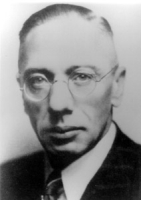
Miner. Father of seven. Member of the Christian miners' labour union at age 19, and secretary at 22. Member of the Zentrum Christian Party at age 20. Worked on Westdeutschen Arbeiterzeitung, (West German Workers' Newspaper), the newspaper of the Catholic Workers' Movement, at age 22, and became its director at age 24.
Non-violent opponent of Nazism from its beginnings. Worked with distinguished Catholic intellectuals who opposed the regime. From Cologne, Germany he exposed the lies and harmful effects of Nazi propaganda, and he worked for the revolt of consciences against Hitler. Declared an enemy of the state, his newspaper was shut down in 1938, but at great risk, he continued to publish an underground edition.
Nikolaus tried to organize resistance among Catholic workers in preparation for the planned assassination of Hitler on 20 July 1944. Though neither he nor the members of his group were implicated in the assassination attempt, Nikolaus was arrested on 12 August 1944 for treason, and sentenced to death by a People's Court on 15 January 1945. Martyr.
30 September 1898 at Niederwenigern, Ruhr region, Germany
• executed 23 January 1945 at the Berlin-Plotzensee, Germany prison
• body cremated, and the ashes scattered
7 October 2001 by Pope John Paul II at Saint Peter's Basilica, Rome, Italy
Glaube, Liebe, Galgen (Faith, Love, Cross) - motto chosen by the diocese of Essen for Nikolaus's beatification
We, Catholic workers, strongly and clearly reject National Socialism, not only for political and economic reasons, but also, decidedly, because of our religious and cultural position. - Blessed Nikolaus
The majority of great enterprises result from daily fulfillment of one's duty in small, everyday things. What is valuable in the doing is our special love for the poor and the sick. - Blessed Nikolaus, 1943
Blessed Nikolaus Gross teaches us to obey God rather than men. Our time urgently needs convinced Christians, who listen to the voice of their conscience and have the courage to speak out when it is a question of the transcendence of the human person. - Pope John Paul II during the beatification ceremony for Blessed Nikolaus
https://catholicsaints.info/blessed-nikolaus-gross/
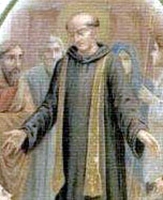
Mauro
Born to the nobility, the son of Equitius, a senator, and Giulia. Disciple of Saint Benedict of Nursia at age 12. Studied with Saint Placid. Deacon. Benedictine monk. Assisted Saint Benedict at Subiaco, Italy, and at Monte Cassino in 528. Founder and abbot of the abbey at Glanfeuil, France in 543; it was later renamed for him. Could heal by prayer, and there are multiple stories of him bringing the dead back to life. At the moment of the death of Saint Benedict, Maurus received a vision of his old teacher travelling a street that led to heaven.
512 in Rome, Italy
• 15 January 584 of natural causes
• relics re-discovered in 845
• relics transferred to St-Pierre-des-Fosses in 868 to avoid Norman invaders
• relics interred in the church of St-Germain-des-Prés, Paris, France
• relics destroyed in 1793 during the anti-Catholic excesses of the French Revolution
• against cold
• against colds
• against goiter
• against gout
• against hoarseness
• against rheumatism
• candle makers
• charcoal burners
• cobblers, shoemakers
• coppersmiths
• lantern makers
• porters
• tailors
• tinkers
• Azores
• Badajoz, Spain
• Casoria, Italy
• Saint-Bonnet-de-Vieille-Vigne, France
• abbot with book and censer
• abbot with crozier
• crutch
• monk saving Saint Placid from drowning while a cowl floats above him
• monk walking on water, which is how he reached Saint Placid to save him from drowning
• man holding the weights and measures of food and drink given him by Saint Benedict
• scales
• spade
https://catholicsaints.info/saint-maurus/
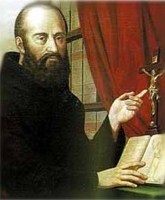
• Gabriele Ferrari
• Camillo
Born to the nobility, the Count of Ferrara, Italy. Trained as a surgeon, he practiced medicine in Milan, Italy and served as personal physician to the Duke of Urbino, Italy. He joined the Brothers of Mercy, a hospital order, in 1591, taking the name Gabriel and making his vows in 1595. Wrote the Nuova Selva di Cirurgia in 1596, which became a standard for teaching surgery in Italian and German. Transferred to a Brothers monastery and hospital on Tiber Island in Rome, Italy in 1598, he became prior of the house in 1599. Provincial of his Order in 1602, and worked in its general administration. Vicar-General of the Brothers of Mercy in the German provinces from 1605 to 1627, he was entrusted with founding houses and hospitals throughout the region. After successfully treating King Sigismund III of Poland in 1608, in 1609 he founded a hospital in Kraków, Poland, and then later elsewhere in Poland, Lithuania and Belarus. After successfully treating Emperor Matthias of Austria, he founded a hospital in Taborstrasse in Vienna, Austria in 1614. After successfully treating Archduke Ernst of Styria, saving his arm from amputation, he founded a hospital in Graz, Austria in 1615. Brother Gabriel served as a field surgeon in the Thirty Years War, and worked with imperial troops at the battle at Jasna Gora near Prague in 1620; this led to his leadership of a hospital in Prague in 1621. Helped found a hospital in Neuburg an der Donau in modern Germany in 1622. Archduke Ernst’s brother, the Holy Roman Emperor Ferdinand II, supported Gabriel, and in 1624 provided support to the Brothers of Mercy in Austria. Founded the hospital in Trieste, Italy in 1625. At his death, he left behind a network of houses bringing the Brothers to piety, and hospitals caring for the poor.
c.1543 in Milan, Italy as Camillo
• 15 January 1627 in Vienna, Austria of natural causes
• relics enshrined in the church of the Brothers of Mercy on Taborstrasse in Vienna
https://catholicsaints.info/blessed-gabriel-of-ferrara/
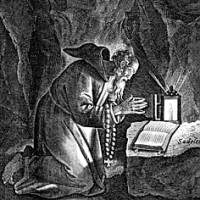
• Macarius the Elder
• Macarius the Great
• Macarius the Thébaïde
• Makarios the...
Shepherd in the desert region of Skete. Falsley accused of assaulting a woman, but was acquitted. Hermit. Spiritual student of Saint Anthony the Abbot. Founder of a monastic community in Skete. Ordained at age 40. His sanctity drew followers, and his desert community numbered thousands at his death. Fought Arianism, and was exiled for it. Several Libyan desert monasteries still bear the name Macarius.
c.300 at Upper Egypt
390 of natural causes
• old hermit with long, white hair wearing a girdle of leaves with two lions near him
• hermit expelling the devil with a cross
• with Saint Onuphrius the Great and Saint Peter of Athos
Lord, be merciful now that my life is approaching its end, and the evening awaits me. There is not enough time for me to cleanse myself of my sins, for they are so many. Heal me while I am still on earth, and I shall be truly healthy. In your mercy, move me to repent so that I shall not be ashamed when I meet you in heaven. - Saint Macarius of Egypt
https://catholicsaints.info/saint-macarius-of-egypt/
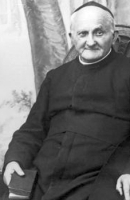
Arnold felt an early call to the priesthood, and was ordained in August 1861. Well educated, he taught science and catechism for twelve years. Chaplain and director of the Ursuline convent at Kempen in 1873. Director of the diocesan Apostleship of Prayer in 1874. Editor of a journal about missionary work in 1873.
He established the religious congregation Society of the Divine Word in Steyl, Netherlands in 1875; it received papal approval in 1901. The Society, which soon had houses in the Netherlands, Austria, and Germany, was composed of missionary priests who worked in Tonga, New Guinea, Japan, Paraguay, and throughout North America.
In 1889, Arnold founded the Missionary Sisters, Servants of the Holy Ghost to assist the priests in their mission. The Sisters serve as teachers in mission lands, especially of young girls. With the help of Blessed Maria Virgo, Arnold formed the sisters a contemplative branch named Sister Servants of the Holy Spirit of Perpetual Adoration who devote themselves to adoration of the Blessed Sacrament, and prayer for the success of missionary efforts. These sisters are nicknamed Pink Sisters because of the color of their habit.
5 November 1837 at Goch, North Rhein-Westphalia, Germany
15 January 1909 in Steyl, Netherlands of natural causes
5 October 2003 by Pope John Paul II
https://catholicsaints.info/saint-arnold-janssen/
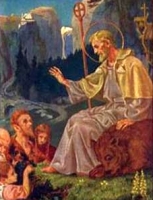
• Romedio of Hohenwart
• Romedio of Salzburg
• Romedio of Sanzeno
• Romedio of Thaur
• Romedius of...
1st Sunday in October (translation of relics)
Born to the nobility, the family of the Counts of Thaur in modern Austria. He learned to read using the Bible and stories of the saints. As an adult, he gave away his fortune to support churches in the Tyrol, turned a family castle into a monastery, and then went on pilgrimage to the tombs of the Apostles; legend says that a bear killed his horse, and in remorse, the bear carried him for the rest of the trip. Cave hermit at Sanzeno on Nonsberg near Salzburg.
Austria
• Salzburg, Austria of natural causes
• relics interred in Sanzeno, Italy
• some relics transferred to Thaur, Austria
24 July 1907 by Pope Pius X (cultus confirmation)
• against accidents
• against bone diseases
• against danger at sea
• against fever
• against fire
• against floods
• against hail
• against headaches
• against toothaches
• prisoners
• theology students
• travellers
• hermit dressed as a pilgrim
• man riding a bear
https://catholicsaints.info/saint-romedio-of-nonsberg/

• 28 September as one of the Martyrs of China
• 6 November as one of the Dominicans Martyrs of the Far East
Joined the Dominicans in Valladolid, Spain. Ordained in Manila, Philippines in 1631. Missionary and parish priest in Cagayan, Philippines. Missionary to China for several years. He made so many converts in Fu-kien that local officials arrested him as a spy. Accused of espionage, political intrigue, witchcraft, disregarding ancestor worship and anything else they could think of, and then tortured; he converted several of his jailers to Christianity. Considered the proto-martyr of the Martyrs of China.
11 August 1607 in Baquerín de Campos, Palencia, Old Castile, Spain
beheaded on 15 January 1648 in Fu'an, Fujian, China
1 October 2000 by Pope John Paul II
https://catholicsaints.info/saint-francis-ferdinand-de-capillas/
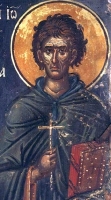
• John Calabites
• John Calibita
• John Chalybita
• John Kalabytes
• John the Hut-Dweller
• Giovanni...
Born wealthy. Ran away from home as a child, and became a monk at Gomon on the Bosphorus at age 12. When he finally returned home as a beggar at age 18, his family did not recognize him. However, the did recognized that he was a holy man, and the family allowed him to live as a hermit in a small hut (a calybe in Greek) near their front door. Only on his death were they were informed of his real identity. His story has led to his being a symbol of homelessness, and how we may not recognize the humanity in the poor and homeless in our midst.
at Constantinople (modern Istanbul, Turkey)
c.450 of natural causes
• beggar with a Gospel in his hand
• beggar revealing his identity to his parents on his death bed
https://catholicsaints.info/saint-john-calabytes/
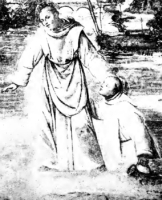
Placidus
5 October on some calendars (confusion with an earlier martyr of similar name)
Son of a patrician senator named Tertulus. Sent as a boy to study with Saint Benedict of Nursia at Subiaco, Italy, he became one of Benedict earliest followers. Friend of Saint Maurus, who saved him from drowning. Accompanied Benedict to Monte Cassino in 529, it being built on land given to Benedict by Tertulus. Known through the second Dialogue of Saint Gregory the Great.
Many legends grew up around Placid, and his story became mixed with a martyr name Placitus who was apparently a monk, and possibly an abbot, who was killed with 30 brother monks by Muslim invaders at Messina, Italy, but that appears to have been a completely different person and era.
being saved from drowning by Saint Maurus
https://catholicsaints.info/saint-placid/

• Ephysius of Cagliari
• Efisio, Efeso, Ephise, Ephysus
1 May (some confraternity calendars)
In Rome, Italy, Ephysius gained the favour of emperor Diocletian who made him governor of the island of Sardinia. Convert to Christianity. Diocletian then had him stripped of office, tortured and murdered. Martyr.
in Palestine
• beheaded in 303 on Sardinia, Italy
• relics transferred to Pisa, Italy
• Cagliari, Italy
• Pisa, Italy
• Sardinia, Italy
• young soldier receiving a banner and sword from an angel
• receiving a vision of Christ before a battle
• young man in an oven
• young man tied to a stake and preaching to his torturers
• young man being beheaded
https://catholicsaints.info/saint-ephysius-of-sardinia/
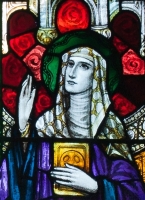
• Ita of Clúaincredal
• Ita of Hy-Connall
• Ita of Ireland
• Ita of Munster
• Ita of Waterford
• Deirdre, Dorothy, Meda, Mida, Ytha, Ide, Mide
Born to the Irish nobility, possibly a member of the royal family. She refused to marry, and eventually received her father's blessing to live a celibate life. Founded the convent at Hy Conaill, County Limerick, Ireland which attracted large numbers of nuns. Founded a school for boys in Killeedy; one of her students was Saint Brendan. Second only to Saint Brigid in popular Irish devotion. Many extravagant miracles have become associated with her including healing a man who had been decapitated, and living solely off food delivered from heaven.
at Drum, County Waterford, Ireland
c.570 of natural causes
diocese of Limerick, Ireland
https://catholicsaints.info/saint-ita-of-killeedy/

On 28 December 1841, the relics of eight martyrs, including an ampule of blood, dating to the time of Diocletian, were found near the cemetery of Sant'Agnese outside Rome, Italy. All we know about them comes from an inscription that translates to “Botonto, who lived three years and two months, (is here) in peace.” Judging by the burial, the people were apparently noble, and probably Greek in origin, but we know nothing else about them.
c.300
• c.303 in Rome, Italy
• interred near the cemetery of Sant'Agnese on the Via Nomentana, Rome
• relics re-discovered on 28 December 1841
• relics donated to King Carlo Albert of Savoy by Pope Gregory XVI
• relics enshrined in a wax effigy on the right side of the San Francesco altar in the church of the Santa Maria al Monte at the convent of Monte dei Cappucini in Turin, Italy on 15 January 1843
https://catholicsaints.info/saint-botonto/
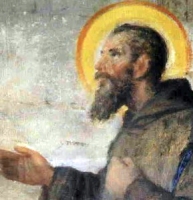
Born to a poor family. Benedictine. As a youth he walked barefoot to Compostela, northern Spain, became a Camaldolese lay-brother, and lived forty years as a hermit walled up in his cell. His life was distinguished by simplicity, innocence, gentleness.
c.1265 at Gualdo Tadino, Nocera, Italy
• 15 January 1325 of natural causes
• interred in the church of Saint Benedict in Gualdo Tadino, Italy
• relics transferred to a chapel in the local abbey church in 1343 by Blessed Alessandro Vincioli
• relics transferred to a new altar in the basilica of Saint Benedict on 16 April 1443
• 1633 by Pope Urban VIII (cultus confirmed)
• 3 August 1825 by Pope Leo XII (cultus confirmed)
Gualdo Tadino, Italy
https://catholicsaints.info/blessed-angelus-of-gualdo-tadino/
Known in lay and religious life for his intelligence, piety, and devotion. Archdeacon of Maguelone in 1199. Cistercian monk at Fontfroide c.1202. Papal legate and inquisitor in 1203 under Pope Innocent III. Assigned to work with the heretic Albigensians, to bring them back to the church. He embarked on a great evangelization campaign through southern France; Saint Dominic de Guzman worked in this effort. Martyred by Albigensians, probably with the support of Count Raymond VI of Toulouse who hoped to use the Albigensian crisis to increase his political power. Peter's murder sparked the Albigensian Crusade against the heretics in southern France.
near Montpellier, France
stabbed with a lance in 1208 near Saint Gilles Abbey by Albigensian heretics
May God forgive thee, brother, as I fully forgive thee. - Blessed Peter's dying words
https://catholicsaints.info/blessed-peter-of-castelnau/
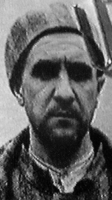
Titu, Titus
Ordained a priest in the Romanian Greek-Catholic Rite on 31 January 1930. Chosen auxiliary bishop of Fagaras si Alba Iulia, Romania and Titular Bishop of Regiana in 1949 and consecrated in secret. Martyred in the Communist persecutions.
1904 in Maioresti (Huduc), Mures, Romania
15 January 1955 in of hypothermia in Sighetu Marmatiei prison, Maramures, Romania
2 June 2019 by Pope Francis
https://catholicsaints.info/blessed-tit-liviu-chinezu/
Bonet, Bonnet, Bont
Chancellor to King Sigebert III of Austrasia. Appointed governor of Marseilles by King Thierry III in 667. Bishop of Clermont, France in 689. He resigned the see when doubts arose about the validity of his election. Bonitus spent his later years as a holy hermit at the Benedictine abbey of Manglieu, Clermont. Pilgrim to Rome, Italy.
623 in Auvergne, France
• c.710 in Lyon, France of natural causes while on the road returning to Clermont, France from Rome, Italy
• relics in the cathedral of Clermont
https://catholicsaints.info/saint-bonitus-of-clermont/
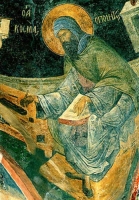
• Cosmas the Hymnographer
• Cosma
Born to a very poor family. Educated by an Italian monk who had been taken prisoner by his people. Monk at the San Saba monastery near Bethlehem. Bishop of Mayuma near Gaza in the Holy Lands in 743 where he served the rest of his life. Known as one of the most gifted hymnist of his era.
706 in Jerusalem
760
https://catholicsaints.info/saint-cosmas-the-melodist/
Jaime
Son of Lucantonio and Mustiola Villa. He was a pious child, and as a young man repaired an old hospital and used it to care for the sick poor. Studied civil law in Siena, Italy. Priest. Franciscan tertiary. When a noble in Chiusi, Italy illegally took property belonging to the city hospital, Giacomo took the case; he won it and all appeals. The noble then had Giacomo killed in revenge.
axed to death on 15 January 1304 in Citta della Pieve, Italy
by Pope Pius VII (cultus confirmation)
https://catholicsaints.info/blessed-giacomo-villa/
Ceolwulf
Eighth century king of Northumbria in England. Patron and supporter of Venerable Bede who dedicated his Ecclesiastical History to Ceolwulph. In later life Ceolwulph abdicated and became a monk at Lindisfarne Abbey, possibly as a way to prevent a war over his throne.
England
• 764 of natural causes
• relics translated to Nohram-on-Tweed, England in 830
• some relics later transferred to Durham, England
https://catholicsaints.info/saint-ceolwulph/
Monk. Abbot. Founder of the Acremetre (Greek: without sleep), monks of Asiatic origin. He converted Saint Rabulas, the governor of Edessa, by a miracle. In the desert he converted thirty robbers, and changed their den into a monastery. Founded a monastery on the Euphrates. With 300 monks, he settled at Gomon in Bithynia, and divided them into six choirs to sing the Divine Office, so that it might ascend ceaselessly, night and day.
c.440
https://catholicsaints.info/saint-alexander-of-goman/
Ablebert, Emebertus, Einbert
Son of Count Witger and Saint Amalburga; brother of Saint Gudule and Saint Reineldis. He was early drawn to the religious life. MonkBishop of Cambrai, France. Known for his personal piety and the example he set for his flock.
• c.710 of natural causes
• buried at the church of Our Lady and Saint Aldegondis in Maubeuge, France, but his grave has since been lost
https://catholicsaints.info/saint-emebert-of-cambrai/
• Lleudadd of Enli
• Lleudadd of Bardsey Island
• Laudat, Laudatus, Leuddade, Lawdog, Llawddog, Llendadd
1 January (as one of the Breton Missionaries to Great Britain)
Monk. Abbot of Bardsey, Gwynedd, Wales. Worked with Saint Cadfan in Brittany.
Welsh
6th century Wales of natural causes
https://catholicsaints.info/saint-lleudadd-of-bardsey/
Conanus, Cunanus
Cistercian monk. Third abbot of the Margam monastery in Wales in 1156, he served there until his death, 37 years later. Contemporaries referred to Conan as “a scholar and wise abbot”, and wrote that the monastery was more famous for its charity than any other in Wales.
early 12th century Wales
1193 in Wales of natural causes
https://catholicsaints.info/blessed-conan-of-margam/
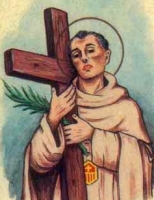
Mercedarian monk. Spiritual student of Saint Serapion of Algiers. Master of novices. Sent to Granada to redeem prisoners held captive by Muslims, he was imprisoned, tortured, starved and killed for his faith. Martyr.
Toledo, Spain
1237 in prison in Granada, Spain
https://catholicsaints.info/blessed-diego-de-soto/
Son of the imperial pro-consul of Alexandria, Egypt. When Pansofius came into his inheritance, he gave away his entire fortune to the poor and lived as a hermit outside the city for over 20 years. During the persecutions of Decius, Pansofius' reputation for sanctity led to his arrest and execution. Martyr.
c.250 in Alexandria, Egypt
https://catholicsaints.info/saint-pansofius-of-alexandria/
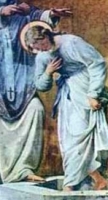
Convert, baptized by Saint Magnus of Anagni. Martyred in the persecutions of Decius.
Anagni, Italy
• c.250
• interred in the cathedral of Anagni, Italy
https://catholicsaints.info/saint-secondina-of-anagni/
Blathmac, Blaithmale
Born a prince, the son of an Irish king. Monk. Abbot. Missionary to England and Scotland, hoping to work with the pagan Danes then invading. Martyred by them.
Ireland
823 on the altar steps at Iona Abbey, Scotland
https://catholicsaints.info/saint-blaithmaic-of-iona/
Isidore of Alexandria
Desert hermit. Priest in charge of a Alexandria pilgrims hospice. Opposed Arianism, supported Saint Athanasius, and was persecuted by Arians. Friend of Saint John Chrysostom.
Egyptian
404
https://catholicsaints.info/saint-isidore-the-egyptian/
• Arsenius of Armo
• Arsenio...
Hermit famous for his austere lifestyle and deep prayer life.
904 in Armo, Italy of natural causes
https://catholicsaints.info/saint-arsenius-of-reggio-calabria/
Palladio, Pallas
Fifth century monk at Condat (modern Saint-Claude), France. Friend, travelling companion and spiritual student of Saint Romanus of Condat.
latter 5th century
https://catholicsaints.info/saint-palladius-of-condat/
Tetha
Born a princess, the daughter of Saint Brychan of Brecknock in Wales. She is mentioned in 13th century documents. A Cornwall church bears her name. No details of her life have survived.
Saint Teath, Cornwall, England
https://catholicsaints.info/saint-teath/
• James Limosnero
• Jacobo...
Supporter and advocate for the poor and oppressed in the 13th century.
Città della Pieve, Umbria, Italy
https://catholicsaints.info/blessed-james-the-beggar/
Tarsitia
Granddaughter of King Clotaire II of the Franks. Sister of Saint Ferreolus of Uzès. Lived as a hermit near Rodez, France.
c.600 of natural causes
https://catholicsaints.info/saint-tarsicia-of-rodez/
Young woman martyred in the persecutions of Decius. Her guards were converted to Christianity by her testimony of faith before the judges.
flogged to death c.250 in Rome, Italy
https://catholicsaints.info/saint-secundina-of-rome/
Bridget, Brigid, Brigida, Brigitta, Brigitte, Britte
Fourth century nun. Martyred with Saint Maura. Their story was lost, and their relics were discovered by Saint Euphronius.
martyrs
https://catholicsaints.info/saint-britta/
Desert hermit. Priest of Scété, Egypt. Worked to bring angry or negligent brother desert monks back to proper devotion.
c.394
https://catholicsaints.info/saint-isidore-of-scete/
Friend of Saint Bernard of Clairvaux. Prior of Clairvaux Abbey. Refused the bishopric of Tournai, Belgium.
1147 of natural causes
https://catholicsaints.info/blessed-geoffrey-of-peronne/
Llywelyn
Monk at Welshpool and Bardsey, Wales. Friend of Saint Gwrnerth.
Welsh
6th century Wales of natural causes
https://catholicsaints.info/saint-llewellyn/
Ordained in Rome, Italy. Worked with Saint Severinus in Noricum (part of modern Austria), and wrote a biography of him.
North Africa
c.511
https://catholicsaints.info/saint-eugyppius/
Bishop of Chartres, France. Attended the Council of Chalons-sur-saone in 650.
latter 7th century
https://catholicsaints.info/saint-malard-of-chartres/
Monk at Welshpool and Bardsey in Wales. Friend of Saint Liewellyn.
Welsh
6th century Wales of natural causes
https://catholicsaints.info/saint-gwrnerth/
Fourth century nun. Martyred with Saint Britta. Their story was lost, but their relics were discovered by Saint Euphronius.
martyrs
https://catholicsaints.info/saint-maura/
Welsh chieftain. Father of Saint Asaph.
Welsh
6th century
https://catholicsaints.info/saint-sawl/
Bishop of Rieti, Italy.
c.571
https://catholicsaints.info/saint-probus-of-rieti/
• Our Lady of Banneux
• Amaro the Pilgrim
CatholicSaints.Info Portable Edition